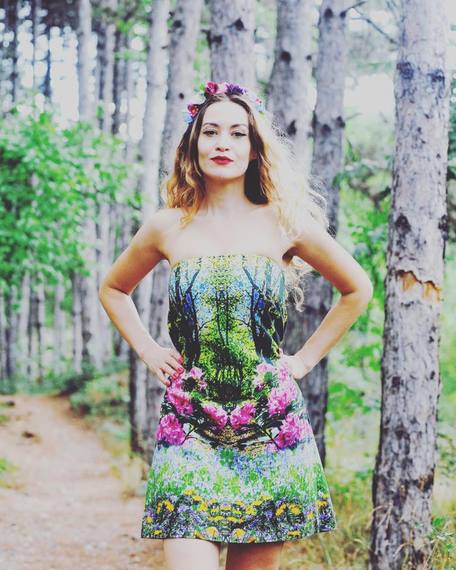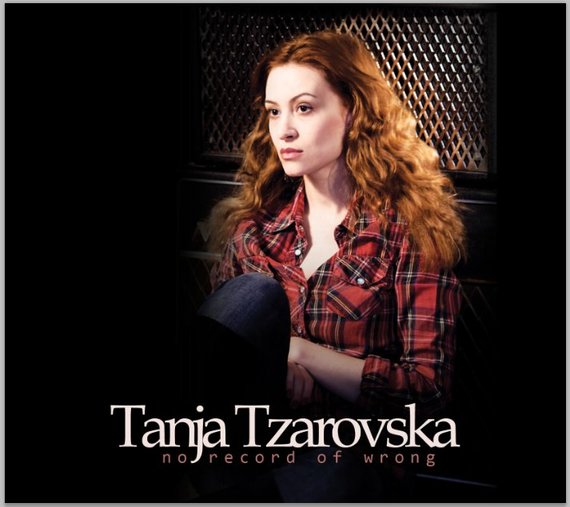Tanja Tzar has had quite a journey.
When she started performing at music festivals in her native Macedonia in the late 90's, few could have guessed that this shy girl with an angelic voice would one day become one of the world's best vocalists and end up working with some of the world's most acclaimed composers.
Her voice and arrangements can be heard in the score of the Academy award-winning composer James Horner for Wolfgang Petersen's Troy, including the end titles duet with Josh Groban (produced by David Foster) and in the original score by the Academy award-winning composer Gabriel Yared (The English Patient) for Troy. She was the featured vocalist in Academy award-nominee John Debney's score for Mel Gibson's The Passion of the Christ and also collaborated with the same composer on his soundtrack for Sony PlayStation's Lair.
She appeared in One Giant Leap, the groundbreaking music/philosophy documentary film by Jamie Catto (Faithless) and Duncan Bridgeman. She currently works on the follow up of her 2011 debut album -- No Record of Wrong.
Your biography is truly inspiring. How did a girl from Resen end up working with some of the world's biggest composers such as James Horner and Gabriel Yared?
Yes, those are very interesting chapters of a book that somehow wrote it's self. Though the question can also be rephrased into: How did composers like them had the luck to work with such a hard-to-find, exotic singer from Macedonia? I'm joking, of course! But actually, everyone sees things from their own perspective and we all have our own value and are lucky to work with each-other. The Macedonian musical background I have is truly unique and it was a great foundation to build myself on as a musical person. In my case, I was fortunate to meet great musicians in London. In fact it wasn't even in London initially, I met Robin Jeffrey, the first composer I worked with, in mid air. He and his band were travelling to a gig and we were two strangers sitting next to each other in severe turbulence, wondering if it will end alright. To distract ourselves, we started talking about music and it turned out that for a new project, he was looking for singers who can sing in styles from the Balkan region. Things surely do happen when you least expect them. At that recording session I met Vivien Ellis, a fellow singer who became a friend and along Robin she was also very helpful with recommendations. I was lucky to meet people who appreciated what I did. A lot of film soundtracks were recorded in London at the time so eventually my work path led me to the film soundtrack sphere. There's always some wonderful energy at the studios where music is being recorded and amazing things happen, I have nothing but gratitude for all the wonderful people who's musical paths happened to cross with mine. Especially with Gabriel Yared, because I grew up under the spell of his amazing music and bought all his cds, while never imagining I will work with him one day.
You were quite a famous artist in Macedonia when you decided to leave everything behind and move to the UK. Do you feel that you made the right decision?
I have to believe I did as it's pointless questioning past decisions. But I'm sure that even if I had stayed, I would have found my way to be happy and content. In Macedonia, the ice for me was broken, so perhaps many things would have been much easier to achieve. I would have focused and worked much more on my own personal brand as a singer and music-maker.
Obviously, in London I had to start all over again as a complete unknown session singer. But that on it's own was a fantastic thing, one valuable music lesson after another. I was often required to freely improvise with my vocal parts, so that was also a way of creating, as a part of excellent music teams. All in all, I couldn't be more satisfied with how things worked out for me in the uk, what a wonderful exchange of creativity it has been. I'm leaving my own signature on the music I work on in exchange for universal musical experiences.

Photo Credit: Dragan Perkovski
Do you feel that if artists want to build international career they have to move to the international show business meccas such as London, New York or Los Angeles? Can one actually have a global career by working locally?
Of course they can. It can be equally challenging to be a big fish in a small pond as being a small one in the big sea. The chances, or the lack of them are the same, it's like gambling. The bigger the place, the more chances you have but also the competition multiplies. Many international artists have become globally known from their country of origin because they focused on doing their best there and using all the resources available to them. It's very much down to three things: your understanding and attitude towards the unsteady and challenging path that an artistic profession brings, how hard you work and how good are you at recognising the best people for you to collaborate with, including management and music promoters. It's not easy wherever you are, but it's not supposed to be easy, we must have determination and patience while breathing and enjoying every moment. Which is exactly what's hard, because artists are often torn between having to make money to survive and using that same time to create more work. Now I'm probably going further from the subject, but we have to use all the time available to us, even if it means someone working in a supermarket and writing songs on their break, in the train or bus home, everywhere - don't get discouraged, surprise yourself all the time. However, if too often you feel that you're being "suffocated" by a small area and you're finding it hard to express yourself artistically, then move somewhere bigger, by all means. Try it. Get fresh new energy but don't completely detach from your old life and the people that love you, because having had them has probably helped you become the artist you are.
Your first international breakthrough came with your work on the movie Troy with composer James Horner. How did it feel to work with one of the world's greatest composers? What is your fondest memory of working with him?
It was great to work with James. He was an incredibly calm person yet with huge presence, knowing exactly what he wants. With that he created a lovely working atmosphere. We spent entire two weeks in the studio working on Troy and he just relied on me with trust, putting no pressure on me at any time, so that just let all the music flow out of me naturally, I had time to feel myself and my singing potential. He looked after his musicians, he would ask me how I like my coffee and would bring it to me in the recording room. It's sad that he's gone, unbelievable. But his great work is here to stay, so with that, James Horner too. An artist can not be imagined separately from their work, they go together even after their death. That's beautiful.
It seems that your work on Troy was just a preparation for your magnificent work on the Passion of Christ. I personally feel that your voice gave the movie an entirely new dimension. It was such an integral part of the movie. How did it happen to work on this project?
Thank you. If I remember well, I was recommended for it by Don Gallagher, a soundtrack music supervisor I had worked with previously. In fact, The Passion of the Christ came for me sooner than Troy, in a way. I did a test vocal recording for it sometime before starting to work on Troy. And then I heard nothing back from that team for a year. Tell me about waiting for a call back forever :) It turned out, there were financial obstacles in making the film in the meantime, things were on standby for so long, including me of course. But the determination of Mel Gibson payed off in the end and when the film was finally in a post-production stage, I got a call again to record the vocals.
Many say that Mel Gibson is one of the hardest people to work with in Hollywood. What is your experience of working with him?
Firstly I didn't expect him to be at the recording at all, but he was, completely in control of everything. I was really in awe of how he literally carried this film himself, being present everywhere, with the actors, with the crew, with the music team etc. It was his project and he didn't leave much to luck and to other people to do his job for him. So of course they'll say he is hard to work with, but I really appreciate that trait in people and I'm exactly like that myself, when something is important, I'm there a 100 percent. He even stood with me the whole time in the recording room, talking things through between takes. The music was important to him so much and he wanted it to be amazing, which it was. It's an incredibly beautiful soundtrack by John Debney and there is a team of amazing musicians on it. It was a wonderful experience, even more so because we were in Air Studios, which is an old church, watching the film on a screen and me singing over the footage. Incredibly moving, I was pretty much in tears.
To be honest, after your amazing success on these two projects I truly felt that you are on the verge of becoming a global music phenomenon. Do you feel that you used the momentum of working on these huge projects wisely? Looking back do you feel you could have done more? Achieved more? Do you maybe have any regrets?
Well, it was just after this two projects that I realized I was pregnant and had a baby, so I had to chose between achieving more in the music world or achieving motherhood. That was also another momentum altogether. I chose to be a mom and that meant that everything else came second for a few years, I didn't travel much, moved away from the London buzz and and the pace became slower. But I used that slow pace as the perfect opportunity to put the spotlight back on writing my own material and doing what I most love, so I wrote and recorded my own album. Before it was impossible to organise myself and endure something like that.
Your album No Records of Wrong is a true masterpiece. Can you tell us more about the creative process behind the album?
Thank you, I'm really happy to hear you like it. It was a lovely time. I was a mother of a toddler and that was very intense, but I think the intensity woke up my drive to make music again. The album was written and recorded in three different towns in Macedonia -- Bitola, Ohrid and Skopje, but a lot of the ideas were firstly born in London. I wrote a lot of things on the road, ideas just overflowed while listening to Leonard Cohen on the car stereo and other great artists... First we started recording things in Bitola, which is an old and inspiring town of culture and film, then I rented a little house in Ohrid during the summer, just to turn it into a creative space and studio. It was lovely and peaceful so my co-producer Mark Purpose and I worked there every day, simply recording ideas and putting things together little by little. I was often sitting in the sunny garden and writing songs, big on emotions from the crazy and wonderful change that motherhood brought to me. Then we moved the whole thing to a studio in Skopje when the autumn came and finished everything in the gloomy depts of winter. We had little sleep, little time to eat and rest, we were fully absorbed in the music the entire time. Great musicians played on it and it was beautiful finding, meeting everyone and seeing how everyone leaves a new stamp on the whole thing. The album has definitely travelled, hence the opening number, "Home," is about the inevitable changes life brings, the skill of embracing them and the excitement of traveling towards the unknown.
Are you working on a follow up?
Definitely, it's been a few years since then and I've not stopped writing. I'm really excited by the new material and it's often overwhelming so it throws me into periods of confusion over decisions, not knowing what to finish first but I'm confident it will all come together soon.
You have seen how the global music business functions first handedly. What do you think an artist needs to achieve global success? It seems that talent become less and less relevant.
What is your advice for all artists looking to build global career?
I know it's total cliche but not giving up is the only thing you can really do. Keep calm or don't, but always carry on, even with the last resources, make sure inspiration finds you at work. Do things and keep a clear record of what you're doing. You may have nothing to look forward to now, and that's frustrating, but opportunities do not write to us in advance, they just turn up. Make sure you do as much work now as possible, so you have something to present when the chance comes along, or even better, organise them yourself. Either way, don't let go of chances because you weren't prepared. Prepare in the meantime.
Lastly, what are your future plans?
For now, to finish my new album and make as much music as possible. I'm hoping to be able to manage a little Christmas/New Year concert in Macedonia on time. Apart from that, I'm also looking forward to working on an exciting new stage project with composer Jocelyn Pook in London. And of course, to listen to beautiful music as much and as often as I can because that's how we get inspired!



